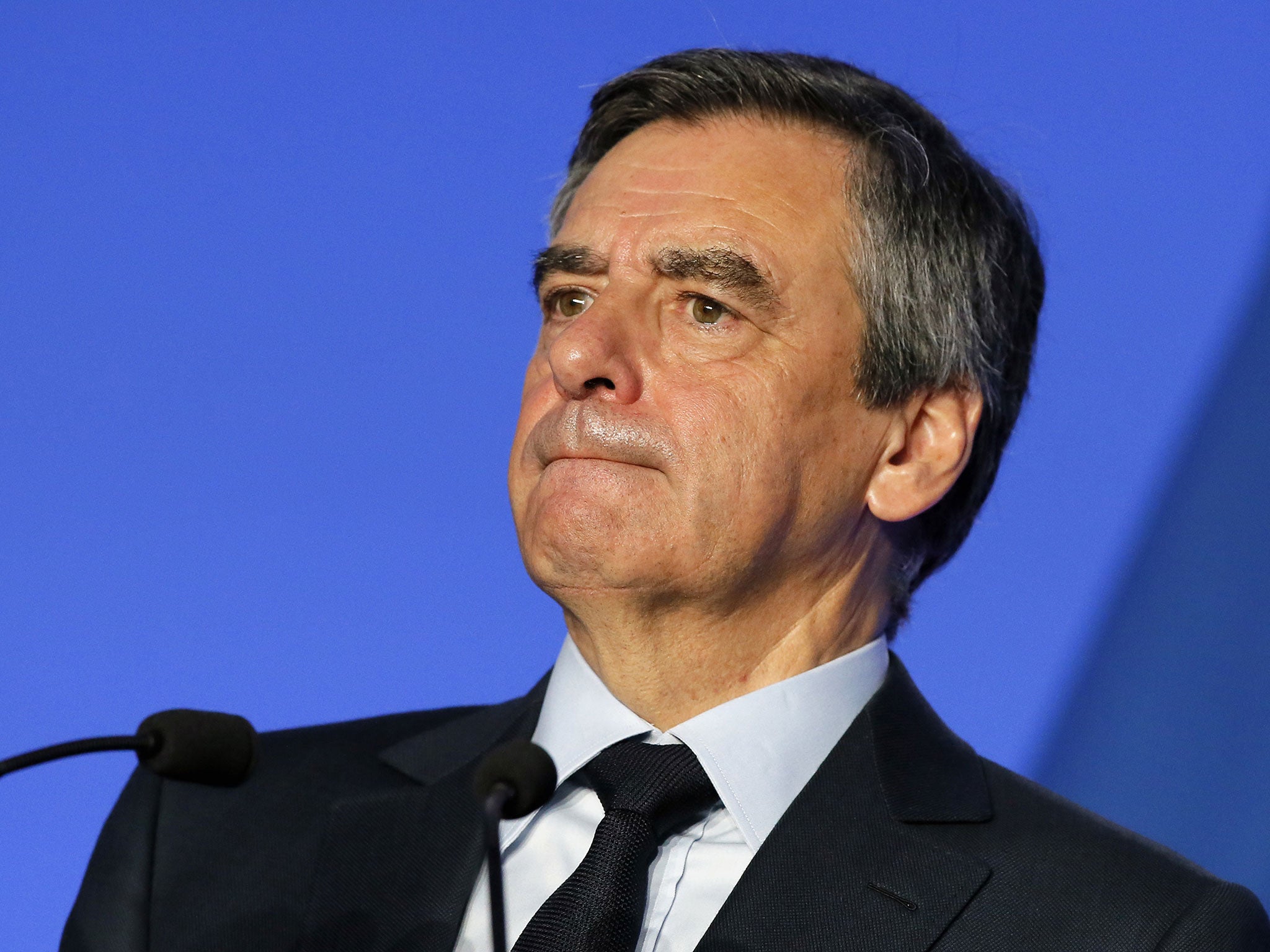When you look into the charges against Fillon, things get very strange very quickly
It is one thing to involve your wife in these sorts of financial affairs. It is quite another to seemingly drag in your children. And why exactly might Fillon, a well-paid politician, be continually short of money?


Your support helps us to tell the story
From reproductive rights to climate change to Big Tech, The Independent is on the ground when the story is developing. Whether it's investigating the financials of Elon Musk's pro-Trump PAC or producing our latest documentary, 'The A Word', which shines a light on the American women fighting for reproductive rights, we know how important it is to parse out the facts from the messaging.
At such a critical moment in US history, we need reporters on the ground. Your donation allows us to keep sending journalists to speak to both sides of the story.
The Independent is trusted by Americans across the entire political spectrum. And unlike many other quality news outlets, we choose not to lock Americans out of our reporting and analysis with paywalls. We believe quality journalism should be available to everyone, paid for by those who can afford it.
Your support makes all the difference.The unsuitable financial transactions that have implicated François Fillon as he competes in the French presidential election are so full of puzzles that they would have interested the Belgian crime writer Georges Simenon. Simenon would surely have seen straight away that his fictional French police detective, Inspector Maigret, should be given the case. He would have called the detective story “Maigret and Monsieur Fillon”.
Admittedly the chief allegation, which has led to the presidential candidate being formally investigated by the judicial authorities, has its parallels in British politics. Le Canard Enchaîné, the satirical weekly newspaper that broke the story, claimed that Fillon’s wife, Penelope, was paid a total of €500,000 (£430,000) over eight years from her husband’s parliamentary expenses for her work as an aide, but did little for it. Fillon states that this is not true. And if that were the sum of it, it wouldn’t have been interesting enough for Inspector Maigret.
In the same issue, Le Canard Enchaîné further claimed that Penelope Fillon earned about €100,000 as literary adviser to Revue des deux Mondes. Again the allegation, also denied, is that Ms Fillon did little work for the magazine. Now who owns Revue des deux Mondes? A certain Marc Ladreit de Lacharrière, who is described as a billionaire friend and who was awarded the légion d’honneur when Fillon was Prime Minister.
Some people have made a connection between the award of the honour to the billionaire and the giving of a job to the Prime Minister’s wife. Penelope Fillon denies wrongdoing and says the employment was genuine. Even this is still not testing enough for a master sleuth.
It is a different matter when we come to the involvement of two of the Fillon children. They were paid more than €80,000 between 2005 and 2007 when their father was a senator. Fillon’s explanation is that Marie and Charles were rewarded as lawyers for specific tasks. But neither was a qualified lawyer at the time. According to Le Canard Enchainé, they drew pay cheques not for assignments, but for two full-time jobs.
Why do I raise an eyebrow here rather than earlier? Because it is one thing to arrange for your wife, rightly or wrongly, to benefit financially from your work. It is quite another to apparently drag your children into the same sort of scheme. Generally parents want to keep their children clear of actions that might not look perfect if disclosed.
Then the Le Parisien newspaper reported that the children had actually paid these earnings into their parent’s bank account. But if the transaction had been a normal, if not very seemly, affair, then most parents would leave the money with their adult children, wouldn’t they?
Marie Fillon’s explanation was that she was paying her parents back for the costs of her wedding. Francois Fillon’s lawyer told the newspaper that Charles, the candidate’s son, was paying back living costs. All very neat and tidy, then, but it doesn’t feel right.
At this point, Inspector Maigret would have been beginning to formulate an initial hypothesis: for reasons unknown, Fillon, the adequately paid French politician, is very short of money. This theory would have drawn strength from the next piece of news – Marc Ladreit de Lacharrière also lent Fillon €50,000, interest free.
The loan, now repaid in full according to Fillon’s lawyer, should have been declared to a state transparency watchdog but wasn’t. Is it usual to suddenly borrow a large sum of money from a friend? Was there a pressing reason?
Finally we come to the tale of the two suits. On Sunday, France’s single Sunday newspaper, Journal du Dimanche, reported that on 20 February, a “generous friend” had signed a cheque for €13,000 for the purchase by Fillon of two suits from a smart tailor, Arnys.
The generous friend explained that he made the payment at Fillon’s request, “and without having had the least thanks since”. When asked about this, the candidate replied, “Et alors?” So what?
This whole episode is strange. It took place when Fillon was already under attack for his alleged financial arrangements with his wife. Inspector Maigret is scratching his head: “There is something odd going on here.”
Fillon is desperate for money. Why? And from where does the pressure come?
Join our commenting forum
Join thought-provoking conversations, follow other Independent readers and see their replies
0Comments